June 21, 2025 | 01:01 GMT +7
June 21, 2025 | 01:01 GMT +7
Hotline: 0913.378.918
June 21, 2025 | 01:01 GMT +7
Hotline: 0913.378.918
Durian is commonly consumed as fresh fruit in Khanh Son district, Khanh Hoa province. Due to the short durian harvesting season, which lasts just over a month, it posed challenges for local consumption, especially during the COVID-19 pandemic.
Given this situation, it is essential to provide solutions to extend the shelf life of durians, take a proactive approach to consumption, and improve the quality of durians.
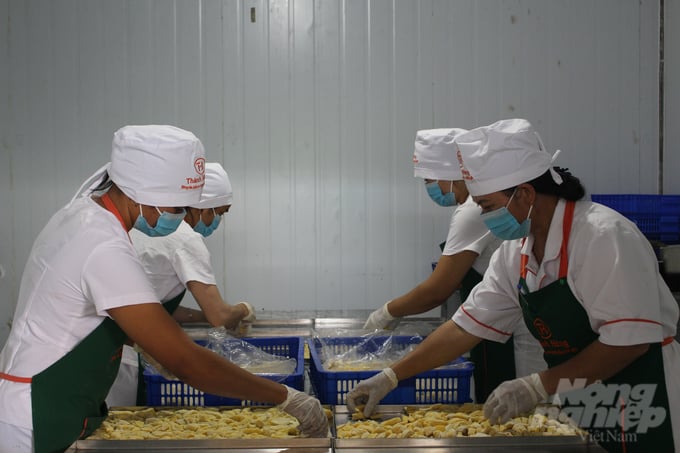
After the ripe durians are husked, they are placed in a quick-freezing storage with a temperature of minus 48 degrees Celsius. Photo: Kim So.
Thanh Hung Agriculture Limited Liability Company in Ba Cum Bac commune, Khanh Son district is one of the leading businesses in the research and processing of agricultural products, including durian.
Ms. Nguyen Thi Minh Hang, Deputy Director of Thanh Hung Company, stated that with a passion for durians, the company has transformed fresh durians into various products including whole frozen durians, dried durians, and durian ice cream. This not only enhances the value of durian fruits but also provides employment opportunities for many local workers.
Thanh Hung Company has invested in constructing a frozen warehouse in order to store and preserve durians in large quantities to supply the market over a long period of time while maintaining their freshness. This approach was effective during the Covid-19 pandemic when durian exports were slow, and domestic traders' access to durian was limited. On the other hand, by observing the popularity of dried durian products from Thailand in the market, the company researched and purchased drying machines to process durians.
Regarding the preservation and processing of durians, according to Ms. Nguyen Thi Minh Hang, post-harvest durians are thoroughly cleaned to remove mold and dirt from the fruits. Subsequently, they are placed in a cool storage area to ripen. When they are ripe, the durians are husked and quickly frozen at a temperature of minus 48 degrees Celsius to prevent deterioration.
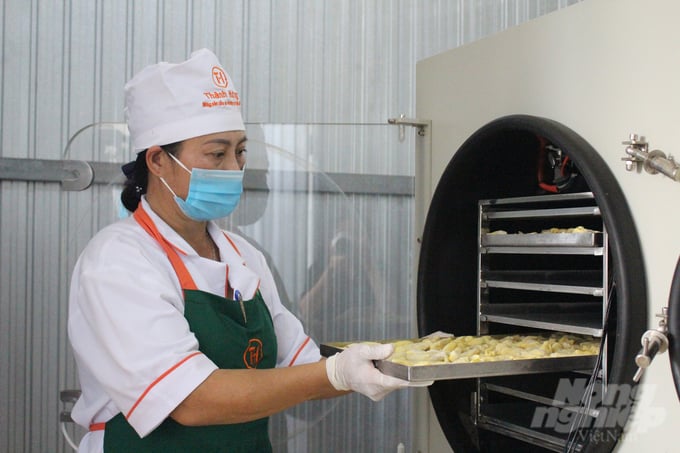
Durian, processed with freeze-drying technology, retains its nutritional value, natural bright yellow color and characteristic delicious, rich flavor. Photo: Kim So.
The dried durian produced by Thanh Hung Company utilizes a freeze-drying technology that helps preserve the nutritional value, natural yellow color, and the characteristic aroma and rich flavor of durians. Furthermore, dried durians have a prolonged shelf life, making them suitable for extended transportation.
"On average, 450 grams of fresh durian yield 100 grams of dried durian. The company's dried durian products are available in several supermarkets in Da Nang, Hanoi, and food stores", Ms. Hang shared. She also mentioned that the company's fresh durians, frozen durians, and dried durians have all been certified with a 3-star OCOP rating. The company is introducing durian ice cream and durian yogurt for OCOP evaluation in 2023, with the aim of upgrading its rating.
Thanh Hung Company currently has over 50 hectares of durian production area, with approximately 22 hectares certified with production unit codes. The company is transitioning to organic durian production to further enhance the product quality. Accordingly, only organic microbial fertilizers, including fish meal, chicken manure, and composted cow manure, are used on the production area. Grass on the area is left to grow naturally, and grass cutting is performed only after the harvest. For pest and disease control, the company utilizes biopesticides and biological control agents.
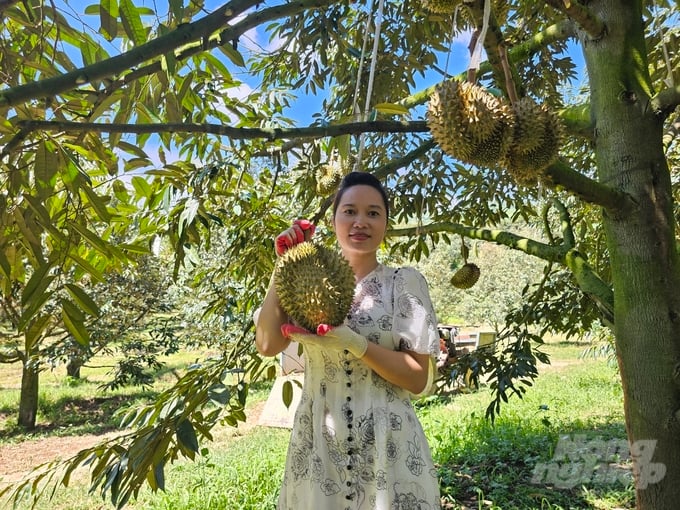
Thanh Hung Company currently has over 50 hectares of durian production area, with approximately 22 hectares certified with production unit codes. Photo: Kim So.
The durian farms cultivated by Thanh Hung Company have been meticulously planned with straight rows, maintaining an approximate distance of six meters between each tree. Employing a modern irrigation system, these farms stand as exemplars of modern agricultural practices. For regions characterized by flat terrain where durian farming thrives, the company has implemented a strategic approach by digging trenches. This measure serves to mitigate issues stemming from seasonal flooding during the rainy months. In effect, it ensures the orchards' ventilation, minimizes susceptibility to pests and diseases, prevents soil erosion, and upholds soil fertility. Consequently, durian trees, particularly those aged between the 7th and 10th years, exhibit excellent yields, averaging approximately 20 tons per hectare.
The production of fresh durians by Thanh Hung Company reached a substantial 400 tons in 2023. Notably, a significant portion of this harvest, amounting to 300 tons, was exported to the Chinese market at the price of 90,000 VND per kilogram. The remaining portion of the durian yield serves as vital raw material for processing, thereby ensuring a consistent supply to the domestic market throughout the year. Moreover, the company also actively engages in the procurement of durians from local households within the district, further bolstering its capacity for processing and distribution.
In the pursuit of effective and sustainable durian production, Mr. Do Nhi Huy, Head of Khanh Son District's Department of Agriculture and Rural Development, spearheads efforts to raise awareness and encourage community participation. His primary objectives include promoting durian production practices tailored to the local climate and soil conditions, as well as securing reliable water sources for irrigation. Concurrently, Thanh Hung Company adheres to Good Agricultural Practices (GAP) and diligently registers its production areas, thereby ensuring the production of high-quality durians that conform to strict export standards.
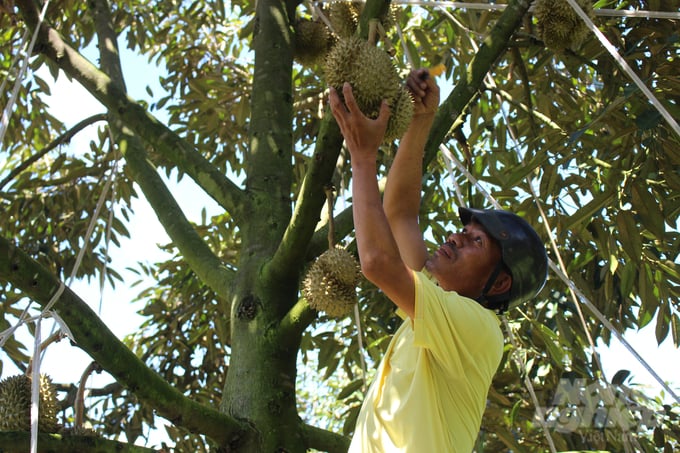
Khanh Son district is closely coordinating with businesses and cooperatives to bring durian production into compliance with organic and VietGAP standards in association with the issuance of production unit codes. Photo: Kim So.
Son Binh Fruit Cooperative located in Sơn Bình commune, Khanh Son district currently houses 15 members who collectively cultivate a 32-hectare durian VietGAP-compliant farm since 2018. This entire area has been officially designated with a production unit code. Mr. Le Anh Quang, the Cooperative's Chairman, explained that they have delegated the production unit code authority to the Chanh Thu Import-Export Fruit Group (Chanh Thu Group) for the legitimate export of durians to the Chinese market. During the current durian season, the Cooperative has supplied over 600 tons of durians to Chanh Thu Group, with prices ranging from 75,000 to 80,000 VND per kilogram.
Mr. Le Anh Quang praised Chanh Thu Group for their fair market-based purchases and adherence to contractual commitments. Consequently, many members within the Cooperative hold confidence in the long-term benefits of this collaborative partnership. They believe that such a production linkage will ensure stable product distribution, providing them with greater security in their production endeavors.
Mr. Nguyen Quoc Dong, Vice Chairman of Khanh Son district People's Committee, disclosed that the district has obtained six production unit codes for durians, covering nearly 200 hectares of production area. Furthermore, several additional applications have been submitted, requesting production unit codes to support the export of durians to the Chinese market, thereby safeguarding the continued growth of this sector.
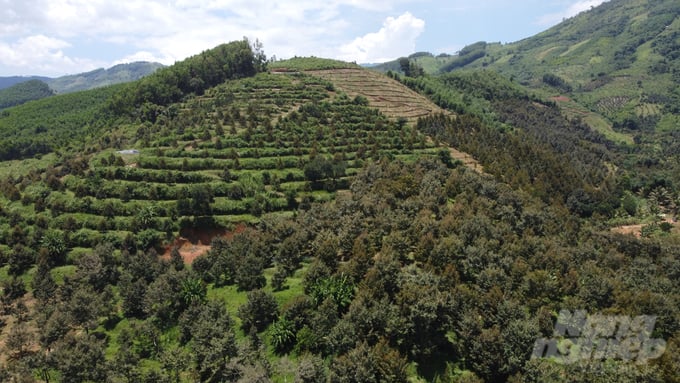
Khanh Son district has six durian production unit codes that span an area of nearly 200 hectares. These codes have been granted official export to the Chinese market. Photo: Phuong Chi.
Khanh Son district has recently intensified its efforts in disseminating information, providing training, and instructing local farmers on durian farming, care, and harvesting techniques in accordance with regulations in an effort to maintain its production unit codes. Concurrently, they have strengthened support for durian production following Good Agricultural Practices and encouraged households to enhance production linkages, synchronize production processes, and meet the criteria for obtaining production unit codes, such as adhering to specified production areas, processes, and product quality standards.
Mr. Nguyen Quoc Dong reported that the district currently houses 450 hectares of VietGAP-compliant production area. Durian production has significantly improved the income and stabilized the livelihoods of many local farmers, enabling them to achieve economic prosperity. Multiple large farmers owners have earned over 10 billion VND annually.
"Thanks to durian farming, the economic well-being of local farmers in the district has improved, with many households achieving affluence. This plays a crucial role in the district's economic development, contributing to poverty reduction efforts and striving to overcome poverty by 2025", remarked Mr. Dong.
Translated by Nguyen Hai Long
/2025/06/17/3942-2-143243_548.jpg)
(VAN) Recently, in Sweden, the Secretary of the Binh Dinh Provincial Party Committee presented the Investment Registration Certificate for the 'Polyester Fabric Recycling Complex' project to SYRE Impact-AB Company.
/2025/06/12/3721-2-202745_83.jpg)
(VAN) TH made an impression at Seoul Food 2025 with its line of natural beverages, paving the way for Vietnamese food products to enter the South Korean market.

(VAN) Soc Trang's success in rice exports stems from a strategy of developing fragrant and specialty rice cultivation areas and standardizing production toward low-emission practices.
/2025/06/11/1311-5-120811_839.jpg)
(VAN) The pig farming industry is facing the challenge of comprehensive restructuring to meet requirements for quality, safety, traceability, and market expansion both domestically and for export.

(VAN) Vietnam considers participating in ALGROALBA in order to expand agricultural production, coordinate the assessment and effective exploitation potential land.
/2025/06/05/5314-1-184727_407.jpg)
(VAN) From seemingly worthless fish scales and skin, enzymes and lactic ferments can transform by-products into peptides, opening a sustainable, effective business direction and elevating Vietnamese seafood.

(VAN) TTC AgriS and IFC signed a strategic partnership to develop a sustainable agricultural value chain, aiming to achieve the Net Zero target by 2035.